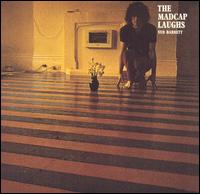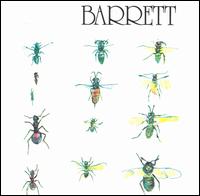Syd
Barrett
Albums reviewed on this
page: The Madcap Laughs, Barrett,
Opel.
For those who have no idea
who Syd was, a brief summary:
1. Original Singer, Guitarist
and Songwriter for Pink Floyd.
2. Major LSD User.
3.
Wrote Floyd's first singles ("Arnold
Layne" and "See
Emily Play') as well as most of their first album, Piper
At The Gates of Dawn (1967).
4.
Major LSD User.
5.
Deteriorates from his drug usage and leaves/is forced out of Pink
Floyd.
6. Records two
albums (The Madcap Laughs and Barrett) and then fades
out.
 The
Madcap Laughs (1970), ****
The
Madcap Laughs (1970), ****
Not as overtly psychedelic as early Pink
Floyd, but
disturbing none the less. Most songs are (seemingly) disconnected
phrases sung in a low voice over Syd's (mostly) acoustic guitar, sort
of disturbed folk songs ("Dark Globe" or "No Man's
Land" which breaks into muttering). But he is so
unpredictable, often with lurching rhythm, that the backing by Soft
Machine is
out-of-sync and they fight to keep up with him (Wyatt's drumming in
"No Good Trying"). Often the songs (and backing) just
sort of end. Barrett's songs about love make more sense than
the rest ("Terrapin" or the haunting "Late Night"),
but Syd also has a couple of "old-timey" numbers "Love
You" and "Here I Go" which are fun, even when he
stumbles. He even took a poem by James Joyce and turned it into
an eerie simple acoustic riff ("Golden Hair"). Where
his lyrics are often bizarre ("If It's In You"), Syd was a
definitely a great songwriter (when he had it together) as seen in
songs like "Octopus", built on a chord progression that is
catchy as hell. At his worst he doesn't sound that bad - just
unprepared (page turning on "She Took A Cold Look", or
false start on "If It's In You", for example).
This album is
certainly odd and likely to be disturbing, but Syd was certainly a
diamond (fallen) in the rough. Produced by Malcolm Jones, or Gilmour
and Waters.
 Barrett
(1970), ***
Barrett
(1970), ***
In
some sense a
jeweler's role is to provide an appropriate setting for
the stones. He tries to hide the defects in the centerpiece,
and bring in complimentary stones that enhance the setting. The
shaping and styling of whatever metal often determines our overall
opinion of the piece. If the setting is over-elaborate it
strikes us as gaudy, if it is poorly made it can override the beauty
of the centerpiece, if it too commonplace it will lack interest.
But what about the rare stone where the defects are the most
interesting feature? Maybe it shouldn't be set at all - simply
set on view for all to see. If it is set, it should be in a way
that emphasizes its unique character. This is despite the
fact that both these answers will greatly cut down the market for the
stone - it would be in much greater demand if it simply set in a way
that tried to hide it's defects and allowed to pass through
mainstream channels. One can't really fault David Gilmour then
for his production on this album. Having to work with a
deteriorating Barrett, and attempting to assemble something of what
Barrett brought. But where The
Madcap Laughs was very much about Syd being honest, open,
a damaged man communicating from the heart, and surrounded by
musicians whose sound reflected his quirky mental state, Gilmour
takes the opposite tack with Barrett. With Richard
Wright working the keyboards, Gilmour on bass, and future Humble Pie
drummer Jerry Shirley this is not a return to The Madcap Laughs
or Piper at the Gates of Dawn. Instead, Wright adds
suitably creepy organ and piano lines echoing Saucerful of
Secrets, and Shirley lacks the subtly necessary for playing with
someone as fragile as Barrett. The result is a sound that is
enveloping, not the sparse, haunting nature of his first album, which
is unfortunate, as Madcap Laughs was significantly about
atmosphere. Barrett's songs are not as strong this time, with
the usual assortment of pop, folky romantic tunes and a renewed
interest in the blues. There is a great deal of bluesy electric
overdubs by Syd (most of it sandwiched between the other musicians)
which is surprising. The pop songs are the best on here, with
"Baby Lemonade" and "Gigolo Aunt" continuing the
line of songs with catchy music and bizarre imagery. You may
not know what he is saying exactly, but you want him to keep saying
it. It is important to note that even at his most inaccessible
(the vocally strained and admittedly tedious "Wolfpack")
his lyrics are still utterly fascinating. Sure there is another
random list of words song ("Rats") and an utterly cryptic
attempt at an old school blues sound ("Maisie" with Syd
mumbling 'Bad Luck' and 'Bride of a Bull' throughout) but these
failures are just part of his charm. Again, the production
detracts from the romantic reminiscing of "Dominoes" which
should have been left unvarnished, but the childlike Syd who cannot
understand those who treat him well (the beautiful "Wined and
Dined") is still a force to reckon with. These are
generally the tracks Gilmour would have been better off letting Syd
perform by himself in several cases, judging by the basic tracks
appended to the album ("Waiving My Arms In the Air", "I
Never Lied to You", "Dominoes"). Perhaps a
Barrett Naked would be an appropriate release. Certainly under
the best circumstances this album could not have been another Madcap
Laughs, but in attempting to make Syd palatable as a sort of
bluesy-folky musician, Gilmour masked the honesty and fragility which
made Barrett so special in the first place.
 Opel
(rec. 1968-70, rel. 1989)
Opel
(rec. 1968-70, rel. 1989)
Outtakes,
demos and such from his two albums. The title track is more
than album-worthy; it's stark, coherent and haunting. Other songs are
essentially acoustic demos of released songs ("Rats"), or
inferior unreleased versions (a crazy overdub version of "Octopus")
The new songs suffer from Barrett's page-turning sometimes ("Let's
Split"), but are still worthy songs ("Milky Way").
The most bizarre is the unconnected one-word lyrics of "Word
Song". Barrett's blues background is evident on "Swan
Lee (Silas Lang)", which is rumored to date back to his Floyd
days. "Lanky (Part One)" is a whacko jam session, even
without studio trickery. More pleasant insanity. For
Barrett fans, a worthy buy.
Yes, for those
not satisfied by these three, there is an out of print CD with his
BBC session, and a new (2001) compilation features the hilarious and
previously unreleased "Bob Dylan Blues".
Presuming your
sanity is still intact, back to the Music page...
 The
Madcap Laughs (1970), ****
The
Madcap Laughs (1970), ****
 Barrett
(1970), ***
Barrett
(1970), *** Opel
(rec. 1968-70, rel. 1989)
Opel
(rec. 1968-70, rel. 1989)